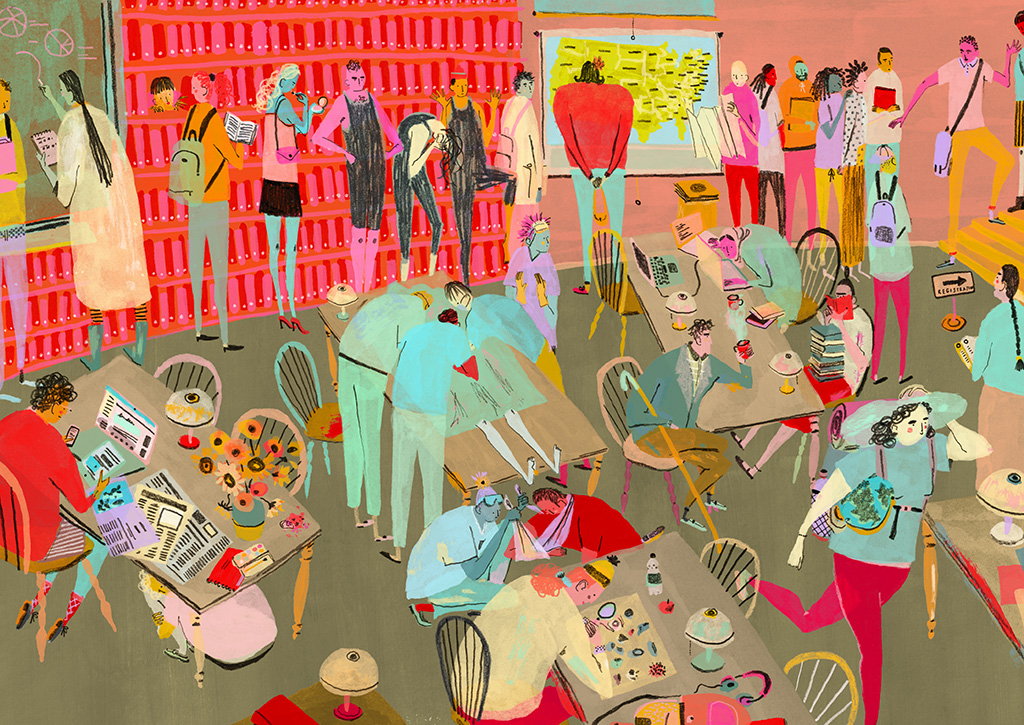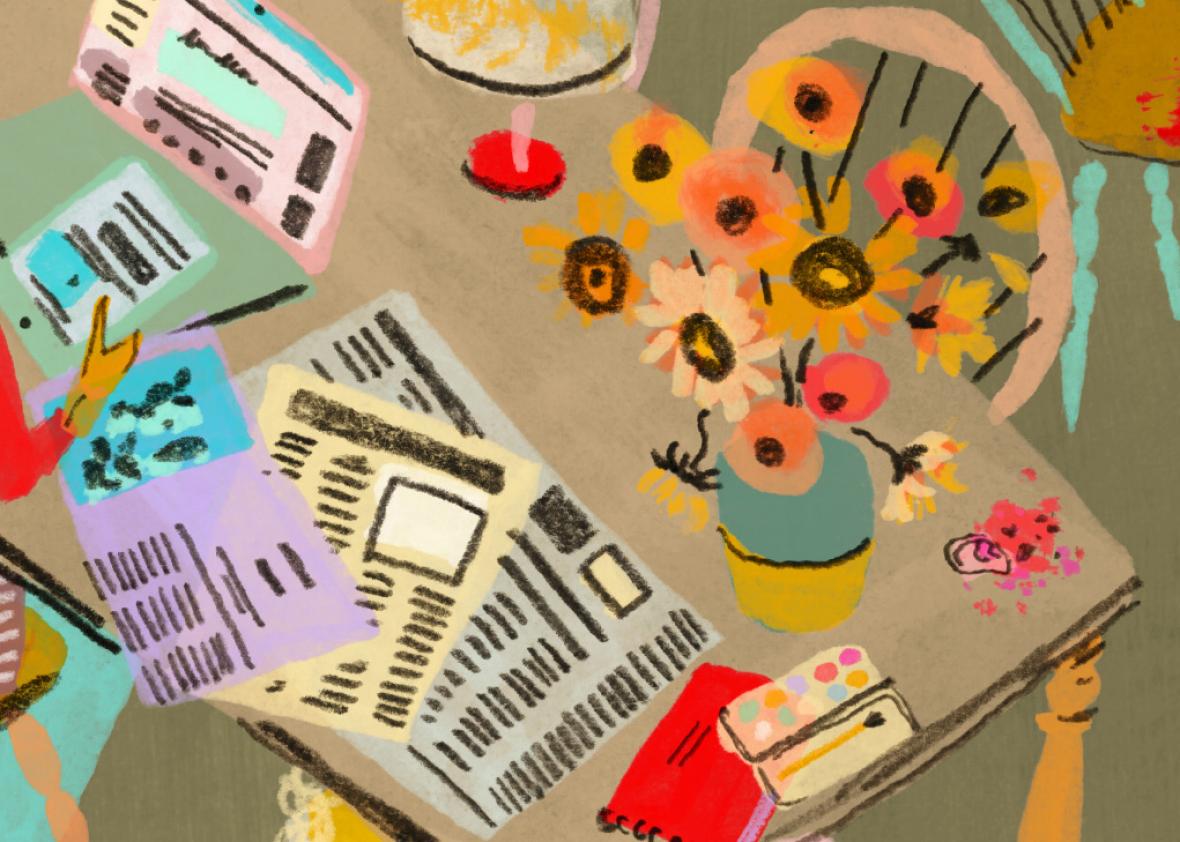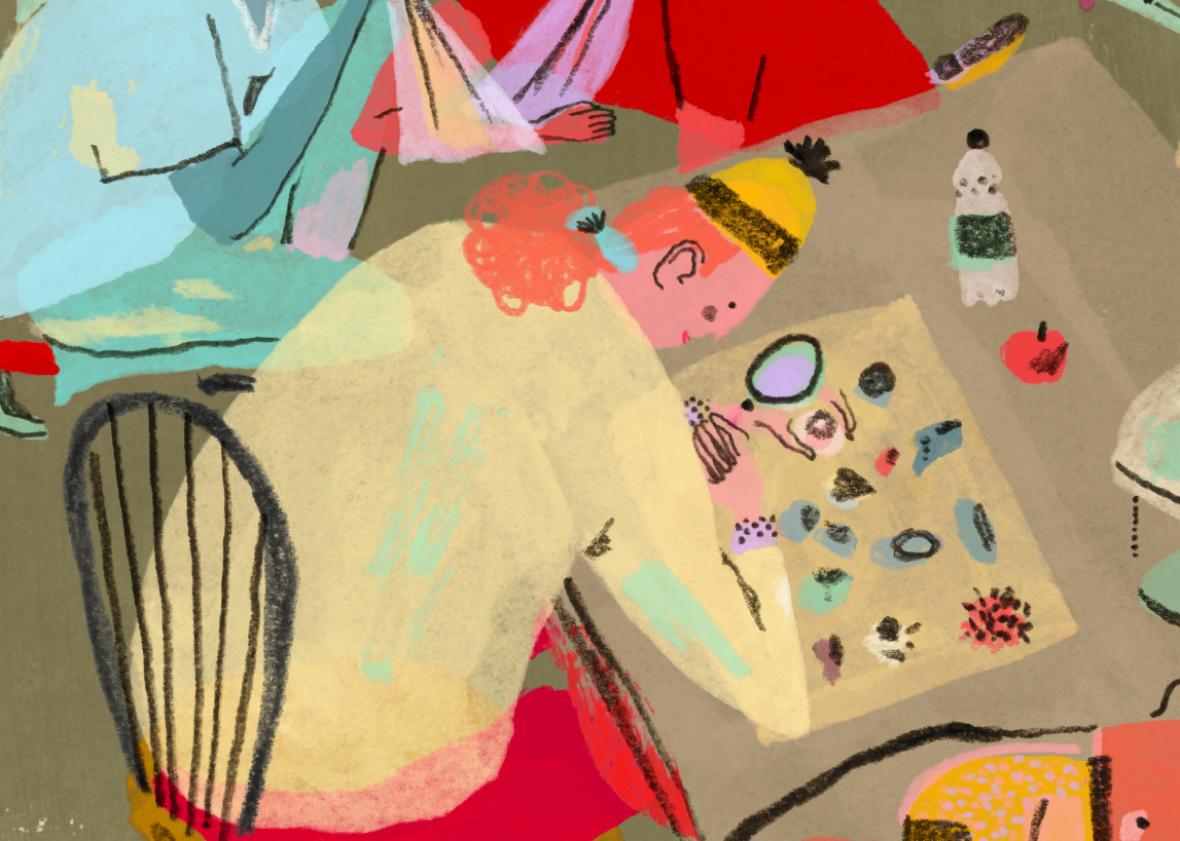What Classes Should I Take?
These are the most useful, practical, life-altering, and enriching courses in an ideal catalog.

Illustration by Mouni Feddag
It’s one of the most agonizing questions in education, a question students face every semester, a question you never really finish answering, no matter how many degrees you earn: What classes should I take? The stakes are high: in cost, time, and lost opportunities to take other classes. It can be an overwhelming decision; there are just so many good ones to choose from.
We at Slate have a lot of opinions about the most worthwhile classes you can take in high school, college, and adult education, and like anybody, we like to give unsolicited advice, so welcome to our week of guidance counseling! We’re rolling out 17 class recommendations, starting with five today. These are the classes that taught us the most important lessons—even if we didn’t realize it at the time.
Take a look at this week’s schedule, below. What’d we miss? On the final day of this series, we’ll collect readers’ best advice. Please let us know what was the most important class you ever took—or the one you wish you’d taken. Email us at classes@slate.com with up to 200 words advocating for your class. And please add your recommendations to the comments section or share them on Twitter using the hashtag #TakeThisClass.
Whether you’re still enrolled in school, taking independent online classes, or teaching yourself new things—there’s always more to learn.
Monday, Aug. 31

Illustration by Mouni Feddag
Introduction to acting. Dan Check, Slate’s vice chairman and former head of technology, says you should take a class in something you’re really lousy at, a class that “exposes you to other people’s talents, rather than your own, and allows you to really bask in the feeling of utter, hopeless ineptitude.”
Human anatomy with a cadaver lab. Megan Cartwright, a science writing fellow, is grateful to people who donate their bodies to science. She learned that “the human body is not magical. It’s beautifully mechanical, and you’ll see that in the cadaver’s dark red muscles, off-white nerves, and the glistening skeleton that holds it all together.”
News media literacy. It’s tricky to know which news sources to trust these days. News editor Chad Lorenz proposes a class that would help people read more skeptically and not get suckered in by biased or irresponsible articles that look like legitimate news. (We may actually develop a course like this for Slate Plus members.)
Statistics and probability. One of the most important things colleges do is teach people to think critically, and books and culture columnist Laura Miller says you can’t think critically without understanding stats.
Coding. Victoria Fine, our director of strategy and audience development, was terrified of coding (and embarrassed about her math-based terror) until she learned a secret technique: Googling. She then taught coding to people who were just as terrified as she was. One girl in the first class period panicked, saying, “I won’t be able to do this! I need more time!” She ended the class elated and high-fived Victoria: “I built a website! I am awesome!”
Tuesday, Sept. 1

Illustration by Mouni Feddag
Art history. Fine art has never been more democratic or accessible than today—but it can be intimidating and mystifying. Mark Joseph Stern says learning how to appreciate and understand art will make your life more rich, beautiful, and satisfying.
Geography. International affairs writer (and National Geography Bee flameout) Josh Keating says it’s never been more important to understand the political and natural features of the world. And Americans are embarrassingly awful at it.
Ethnic studies. Growing up, Lisa Wong Macabasco thought racism wasn’t much of a problem. She didn’t really understand American history—or the history of her people and her state—until she took an ethnic studies class.
Wittgenstein. David Auerbach is a software engineer and technology writer, but the most important—and practical—class he took was on the philosophy of Ludwig Wittgenstein. He says, “Wittgenstein’s philosophy also accounts for the disastrous state of Internet discourse today.”
Take classes pass/fail. Perfectionist Rachael Larimore had a 4.0 high school GPA and a dozen varsity letters, but says, “I didn’t know then that ‘doing it all’ would mean missing out on so much.” High schools should offer a pass/fail option, and college students should take as many extra classes as they can pass/fail, so they can keep their precious grades up while they try things they’re bad at.
Wednesday, Sept. 2

Illustration by Mouni Feddag
Poetry. Dahlia Lithwick, our legal expert, hated memorizing and reciting poetry, an exercise that was terrifying and seemed “rote and silly and futile.” But today, “I do know that at more than one turn in my life, I have stumbled backward into a memory of a stanza or a phrase that suddenly made the moment briefly beautiful, and connected, and deep.”
Public speaking. Glossophobia, or fear of public speaking, is the most common phobia, but it’s easy to overcome with a good class. Nicholas Duchesne says speaking effectively is an incredibly versatile skill; it can help you land a job or manage social stress or deliver a punch line, no matter the size of the audience.
First aid. This class is literally a matter of life or death. Miriam Krule says everybody should learn the basics: the Heimlich maneuver, wound and burn care, how to recognize that someone is in distress, CPR—and make sure you keep your CPR knowledge current.
Thursday, Sept. 3

Illustration by Mouni Feddag
Geology. Slate’s editor in chief, Julia Turner, says you should take this class because it will fundamentally transform the way you see the world and your own place in it.
Math. If you think you’re bad at math, you’re wrong. Software engineer Chase Felker explains that math is simply logic and clear writing, a skill you improve upon with practice like any other, and that the classes get easier as you go along.
Gender studies. Teachers are sick of hearing the standard question: “When am I ever going to use this again?” When it comes to a women’s and gender studies class, Anna Diamond says, the answer is: “always.”
No class at all. “You don’t have to go to college” is the best advice Amanda Hess never took. If she had taken a gap year, she says, “I bet I would have gotten more out of the college experience itself had I paused long enough to feel like I was really choosing it.”
Your favorite classes. In the final story of this package, we’ll collect the best reader recommendations. Please email your advice to classes@slate.com and weigh in on the comments section or tweet your advice using the hashtag #TakeThisClass. What class do you think people should take?